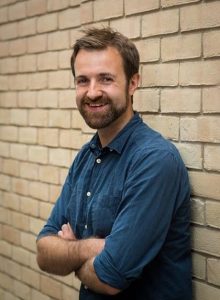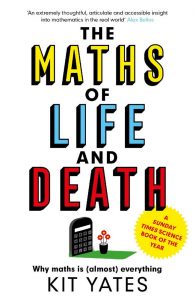With so many of us enduring lockdown isolation, literary folk have turned to books and reading as a source of comfort and company.
We thought we would extend the isolation reading theme further. Here at FbF we have teamed up with several authors, who would have joined us for our original 2020 festival, with a mission to compile a ‘castaway library’. We asked them which books they would take with them if they were abandoned alone on a desert island. You will be intrigued to find out their responses…
Next up, we welcome Kit Yates, author of The Maths of Life and Death to the castaway library.
 My three books to take to a desert island would be…
My three books to take to a desert island would be…
Catch 22 by Joseph Heller
This is probably the only book that makes me laugh out loud consistently to the extent that my wife has banned me from taking it on holiday to read on the beach or reading it in public places. I’m sure the beach on a desert island would be OK though. I’ve read it several times already so I’m sure it would stand the test of time.
Atonement by Ian McEwan.
I’m a huge Ian McEwan fan. He often tries to get into the head of scientists to tell stories while I view myself as using real people’s stories to explain science. I was so delighted when he agreed to read the book and then write a cover quote for the Maths of Life and Death. It’s difficult to choose just one of his novels. I enjoyed Saturday and Enduring love so much, but Atonement had a profound effect on me and is a novel I could return to again and again.
The selfish gene by Richard Dawkins
I did maths as an undergraduate so I came late (compared to many scientists) to the selfish gene. I read it while I was undertaking my Master’s and it made me realise that I could use my mathematical skills to untangle the mysteries of biology. I also credit it, in part, with my desire to want to communicate science to other people. If a book containing well-explained scientific ideas can have such a powerful effect on me, I thought, wouldn’t it be great if I could do something similar for other people. A decade later, along came The Maths of Life and Death.
 I’m currently keeping myself busy communicating the science/maths behind the COVID-19 out break: https://kityates.com/public-engagement/. It helps that the last chapter of the Maths of Life and Death is all about how to predict, understand and stop epidemics.
I’m currently keeping myself busy communicating the science/maths behind the COVID-19 out break: https://kityates.com/public-engagement/. It helps that the last chapter of the Maths of Life and Death is all about how to predict, understand and stop epidemics.I’m also working on my second book “How to expect the unexpected” which is all about predicting the future and what goes wrong when we fail to do it correctly. Look out for it in the spring of 2022.